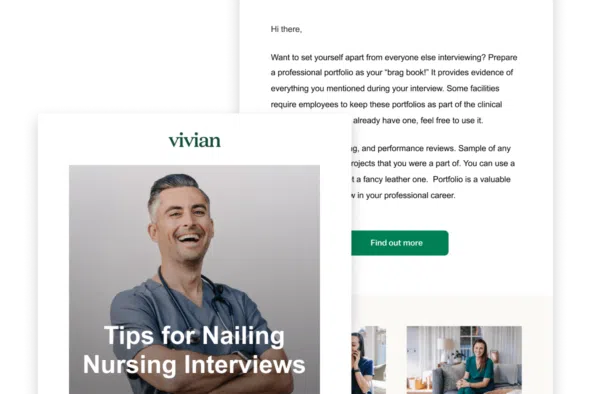In the ever-changing world of healthcare, staying at the forefront of medical knowledge isn’t just a commitment – it’s a necessity. With the rising cost of living, the last thing registered nurses (RNs), licensed practical/vocational nurses (LPN/LVNs) and nurse practitioners (NPs) need are additional expenses to stay current and employable. Luckily, nurses eager to expand their expertise, advance their careers and/or fulfill licensure or certification renewal requirements can find free continuing education units (CEUs) to help them reach their goals without breaking the bank. Get ready to save money while satisfying your professional obligations by exploring the various ways we found to obtain CEUs at no cost.
Do the Groundwork to Find Free CEUs for Nurses
Nurses often face a few hurdles when searching for legitimate free CEUs because lots of courses market themselves as free but have hidden fees. For instance, some courses allow you to take them for free but then charge you a fee to receive the necessary certificate of completion. Read the fine print or ask the course provider whether they give certification for free before starting the course.
Meanwhile, some legitimately free courses turn out to be unaccredited, making them unacceptable to state Boards of Nursing (BONs) for licensing requirements and professional nursing organizations for certification renewals. Always complete due diligence to ensure the program you’re looking at is verified and approved for the CEUs you need. The American Nurses Credentialing Center (ANCC) is the most widely recognized accreditor, so it’s reviewed most CEUs. When choosing courses, look for verbiage that indicates the ANCC or another reputable nursing association has approved the course before you start it.
Strategies to Find Legitimate Free CEUs

Fortunately, many good strategies exist for finding legitimate, free CEUs through Internet searches, employer resources and personal network inquiries. We outline several approaches below.
Check with National Nursing Associations
Nursing associations, such as the American Nurses Association (ANA), are a great place to start your search for free CEUs, especially since such associations are often involved with the accreditation process. The ANA operates Nursing World, which offers a list of both paid and free accredited coursework for continuing education.
Some nursing associations make courses available for free to nurses who are members. For instance, for advanced practice registered nurses (APRNs), the American Association of Nurse Practitioners (AANP) offers a comprehensive index of continuing education courses suited to NPs and other primary care providers, some of which are free to AANP members.
APRNs may take continuing nursing education (CNE) but often take continuing medical education (CME), a type of continuing education that physicians and physician assistants also use. These CMEs usually count toward nurse licensure CEU requirements but check with the program and your state BON first.
Consult Field-Specific Organizations or Local Universities
If your particular field of nursing has an associated organization, check its website to see if it offers CEUs. For instance, the American Association of Critical Care Nurses and the MJHS Institute for Innovation in Palliative Care offer CEUs for nurses in those fields throughout the year. Some colleges—two examples, the University of Michigan and the University of Pittsburg—publish lists of CEUs or offer CEUs through their websites, typically with courses that specifically meet their state’s requirements. Check with the main public university in your state.
Use Online Learning Platforms
Online learning platforms are convenient and centralized ways to earn CEUs. While some platforms offer only paid courses, if you find a course you like, check with your employer to see if they have a membership and log-in credentials for you to use the platform. However, many offer free courses.
A list of Free Online CE Courses for Nurses maintained by myCME and another one from Nurse CEU offers the convenience of online learning. The site Cheap Nursing CEUs also provides a searchable directory where you can look up courses by your nursing level and state to see which courses apply for your licensure, with an option to filter for free courses. While online searches for “free CE for nurses” generally return lots of results, the information may not be accurate or current. Also, some of these sites may claim they offer accredited CEUs but aren’t actually accredited. When in doubt, check with your state BON.
Utilize Your Employee Benefits
Many larger health systems offer CEUs as an employee benefit. These benefits may include courses available directly from the health system itself. Other times, your employer may offer reimbursement for continuing education courses taken online or in-person to encourage nurses to stay educated and keep their licenses up to date through ongoing coursework.
If you’re a travel nurse, check with your agency recruiter. Many larger agencies can connect you with programs to get the CE you need. Some will also reimburse you for CEUs required for a travel nursing assignment.
Attend a Nursing Conference
Attendance at some nursing conferences counts as CE. Although conferences aren’t usually free, if you’re attending anyway or your employer is covering your attendance, you can take advantage of the opportunity to earn continuing education credits simultaneously. There’s typically some documentation you must fill out to claim the CEUs.
Talk to Your Peers or Mentor

Of course, you’re not alone in your pursuit of CEUs. Other providers at your facility or in your area of care face the same challenges to gain the necessary credits in your state. Ask colleagues or supervisors at your facility to learn what programs others have used and would recommend. This inquiry is an ideal time to talk to your mentor in healthcare if you have one or a great reason to find one if you don’t.
Reasons to Pursue Continuing Education
The nursing field is constantly evolving, with improvements in technology and techniques always occurring. CE is crucial to ensure your knowledge remains current to ensure you’re the best nurse you can be, and it’s often required.
Maintain Your License
Many states require a certain number of CEUs to maintain nurse licensure. Each state BON determines what courses count toward its CE requirements.
While some states have very general continuing requirements, such as a minimum of 30 hours every two years in whatever coursework you would like, several states require some hours to be in specific subject matter. These more specific requirements are often for training in areas that are gaining rising attention among regulators, such as opioid or substance abuse treatment, human trafficking education and implicit bias training.
RELATED: Continuing Education Requirements for RN Licensure Renewal by State
States typically specify continuing education requirements down to the contact hour, which is any 60-minute period of instructional learning. However, one CEU is the equivalent of 10 contact hours of educational activity. A state that requires 30 hours of continuing education per license period requires the equivalent of three CEUs. Note that some course descriptions use the term CEU incorrectly as the equivalent of contact hours. It’s best to look up your state’s specific hourly requirements and make sure the coursework you’re taking covers those requirements. It’s always a good rule of thumb to check with your state BON to remain current on the ever-evolving changes in CE requirements.
Career Advancement
Continuing education has a variety of other benefits for healthcare professionals besides maintaining their licenses. Taking CEUs helps you stay abreast of advancements in healthcare and offer quality patient care. In other words, pursuing continuing education is simply good medical ethics.
CEUs can also be useful tools in diversifying your skills and creating opportunities for career advancement. By pursuing ongoing continuing education along a particular track, nurses can develop a particular expertise over time. For instance, taking a certain course of CEUs can be a step toward getting a valuable nursing certification that can help you stand out when seeking a new job or earn higher pay within that field. Most professional certifications in nursing require holders to complete a certain amount of continuing education to maintain their certification, requiring even more CEUs annually or biannually.
You might also want to consider the fastest-growing healthcare careers and pursue education in those areas to help you transition into another nursing field or a management role.
As you acquire new skills and gain valuable skills or certifications with CEUs for nurses, Vivian can help you land your ideal nursing job. Browse healthcare jobs currently posted on our platform and pursue the career of your dreams.
Vivian Health doesn’t endorse any of the CE programs listed in this article. We provide this information as a starting place to explore your free CEU options and always encourage you to do your due diligence before starting any course.









